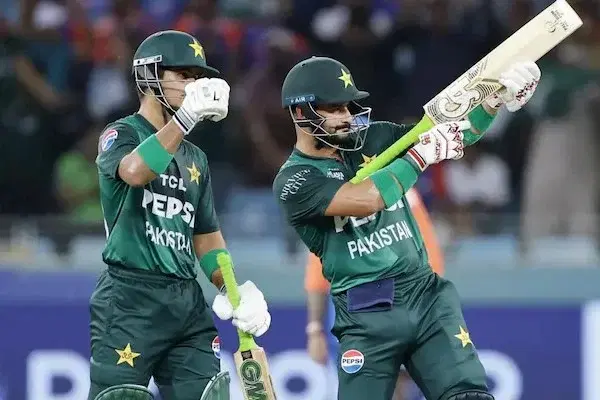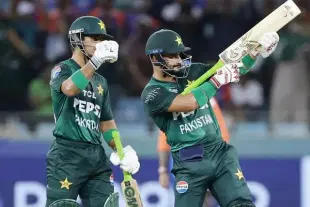Sports
Trigger-Happy In Dubai: Pak’s Shameful Night And The Case For A Cricketing Cut-Off
K Balakumar
Sep 22, 2025, 12:12 PM | Updated 12:19 PM IST
Save & read from anywhere!
Bookmark stories for easy access on any device or the Swarajya app.


It was billed, as always, as the clash of titans. India versus Pakistan in Dubai, supposedly the fiercest rivalry in world cricket. But by the time the match in the ongoing Asia Cup was over, there was little left of rivalry, and even less of cricket.
What the world saw on that Sunday night was not the sporting spectacle it was promised, but the shambolic descent of Pakistan’s players into a theatre of provocation, mimicry, and disgrace. India dominated the field with bat and ball. Pakistan, out of ideas and out of hope, resorted to antics unbecoming of professionals, leaving the ICC with uncomfortable questions and cricket lovers with a bitter aftertaste.
Pakistan’s top scorer, Sahibzada Farhan, after reaching his half-century, turned towards the Indian dugout and mimicked firing a gun. Not a celebratory leap. Not a fist pump. In a sport that prides itself on civility, Farhan’s act was a grotesque parody of aggression. It was not just tasteless, it was dangerous.
ICC must act immediately
Farhan’s senseless show came just months after the Pahalgam terror attack in Jammu and Kashmir, where 26 hapless Indians were killed by Pakistan-backed militants. Against that backdrop, his mimicry of gunfire was more than insensitive. It was incendiary.
This was not a moment of passion. It was a moment of provocation. And it was not isolated. Haris Rauf followed it up with a play-act of shooting down a fighter jet. Together, the gestures blurred the line between sport and hostility that belongs in battlefields.
There are acts that belong to the heat of sport: sledging, banter, even raw aggression. But to simulate a gun on the cricket field, in a match watched by millions, crosses a line that no governing body can ignore. It is a dangerous normalisation of violence in sport. The ICC mandarins, so quick to penalise slow over rates and dissent against umpires, must now show that they are equally firm when it comes to safeguarding the spirit of cricket itself.
In a sense, this was always on the cards, as even before the match began, tension was simmering. Indian captain Suryakumar Yadav once again did not shake hands with Pakistan’s Salman Ali Agha at the toss. It was a continuation of the handshake gate from their previous encounter, where Indian players declined post-match greetings.
Pakistan had, predictably, played victim. Its cricketing establishment spun the incident into a melodrama, even dragging match referee Andy Pycroft into the fray. But there was no rule broken. It was simply a principled stand by Indian players who felt that sportsmanship should not be extended to a team that mocks their nation’s pain.
The message was clear: goodwill gestures are earned, not owed. Pakistan players’ burlesque act on the pitch only validated India’s decision to avoid gestures of friendship off it.
India’s cricketing superiority and sporting restraint
On the field, India was clinical. The gulf in talent and temperament was stark. India has now won seven consecutive ICC tournament matches against Pakistan. The rivalry, as Suryakumar Yadav rightly said, does not exist anymore on the cricketing field. Pakistan is no longer a peer. It is, at best, a prop.
Despite the provocations on the field, India’s young cricketers held their composure. They responded with bat and ball. Yes, there were words exchanged, but Indian cricketers otherwise carried themselves with restraint, choosing not to descend to the level Pakistan cricketers had stooped to.
The timing of Pakistan’s antics is telling. Just months after India’s successful Operation Sindoor, a surgical strike that rattled Pakistan’s terror infrastructure, Pakistan’s cricket team seems desperate to reclaim some semblance of pride. Their cricket, however, is clearly hurting, bruised by consistent defeats at the hands of India, weighed down by administrative chaos, and haunted by the political realities back home.
With no answers in their cricket, theatrics seem to be the only tool left. In the end, Farhan and Rauf’s acts only exposed Pakistan’s insecurities, its inability to compete, and its tendency to conflate sport with State propaganda.
Time for a policy rethink from India
George Orwell once said, “sport is war minus the shooting”. Sports journalists over time turned it into a cliché. But in Dubai, Pakistan almost made that metaphor literal. It tried to turn a cricket field into a battlefield. And it reminded us that some rivalries are better left dormant.
India’s current policy allows cricketing ties with Pakistan only in multilateral tournaments. Bilateral series remain off the table. But even that limited engagement now feels untenable. When players mimic violence, when matches become political flashpoints, when sportsmanship is replaced by symbolism, it is time to ask: is it worth it?
Playing Pakistan is no longer about cricket. It is about managing provocation. About shielding players from hostility. About preserving the sanctity of sport. India must refuse to engage with teams that mock its pain and must demand accountability from international sporting bodies.
Cricket is a beautiful game. It deserves better than gun gestures. It deserves players and sides that respect its spirit. It deserves matches that unite, not divide.
Pakistan, for now, has shown it cannot be that team. And India must respond. Not with anger, but with absence.





